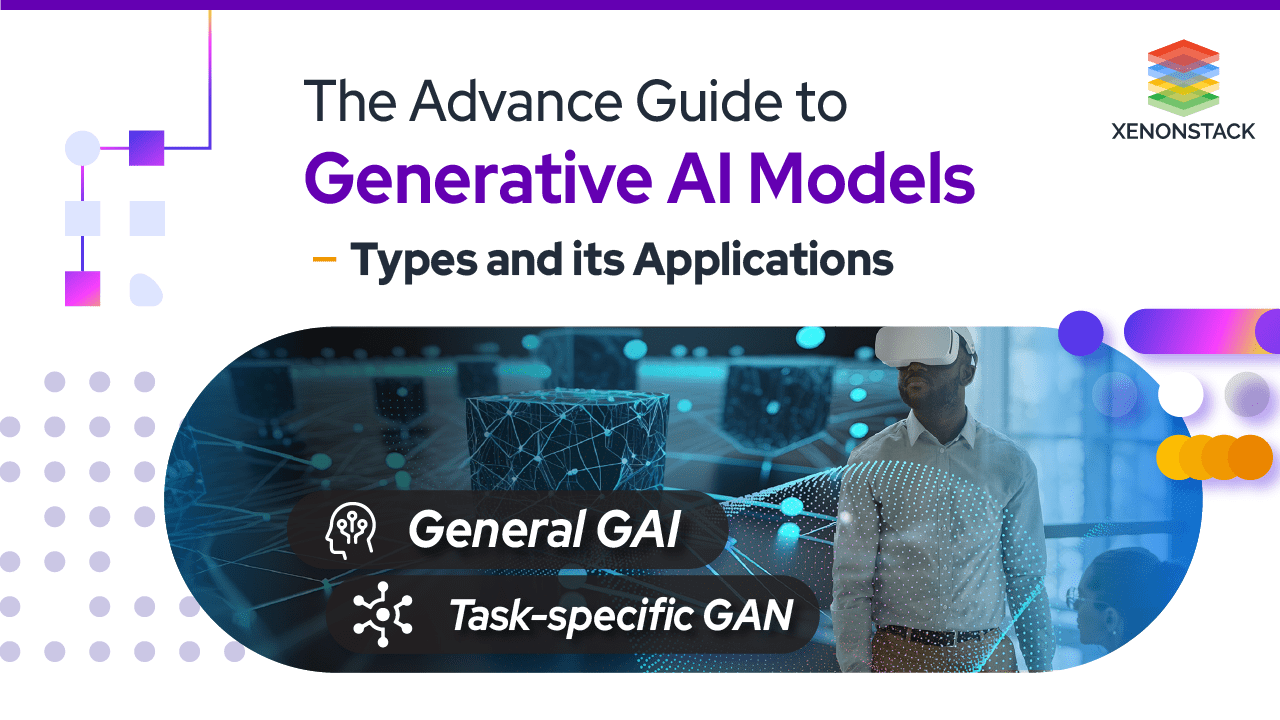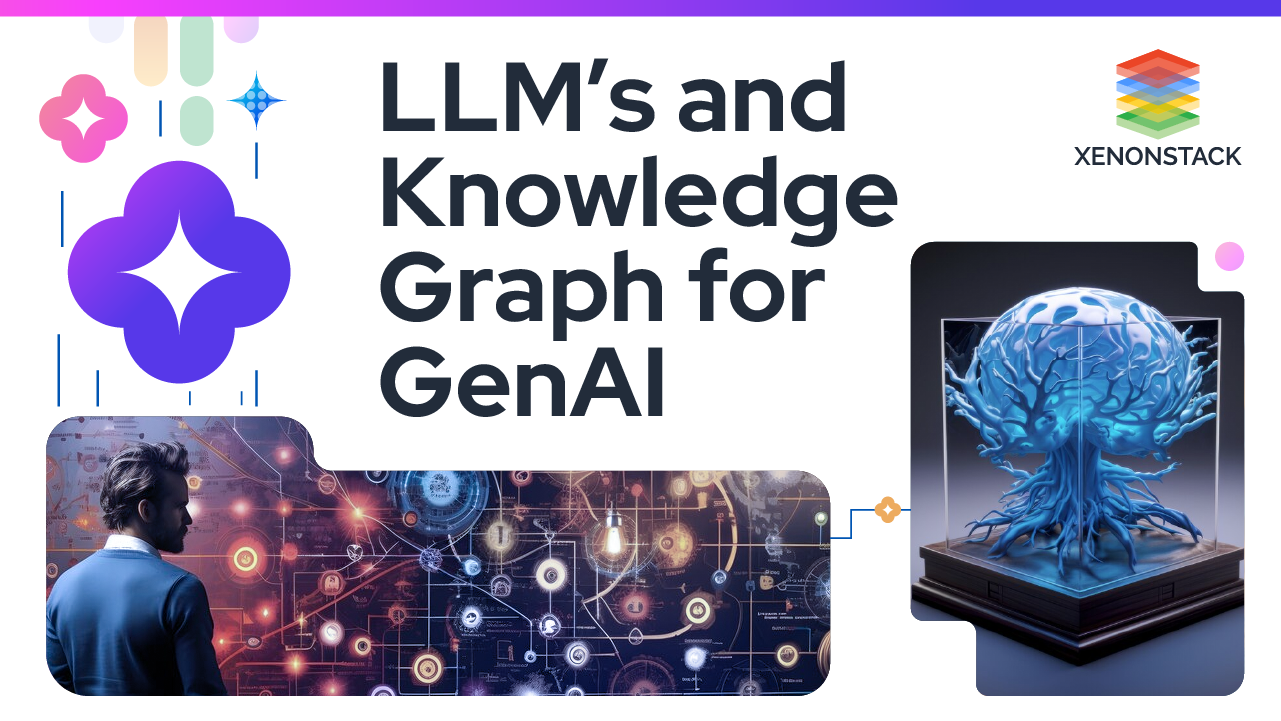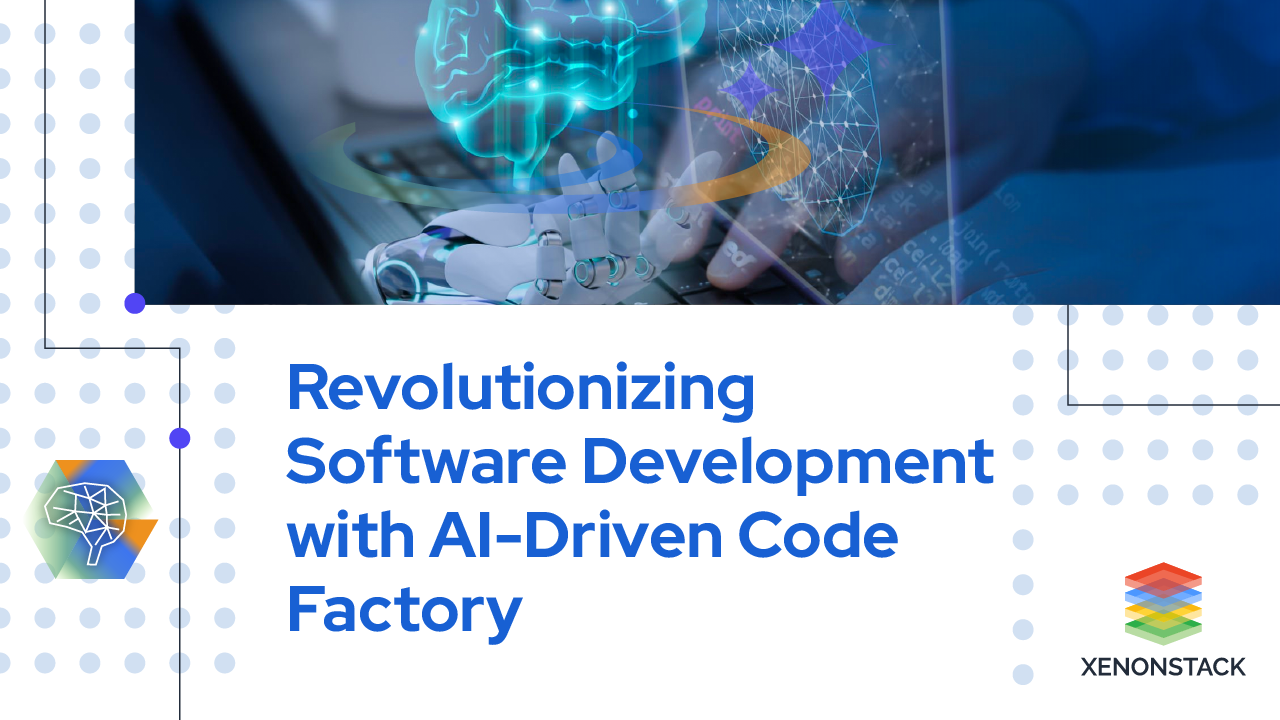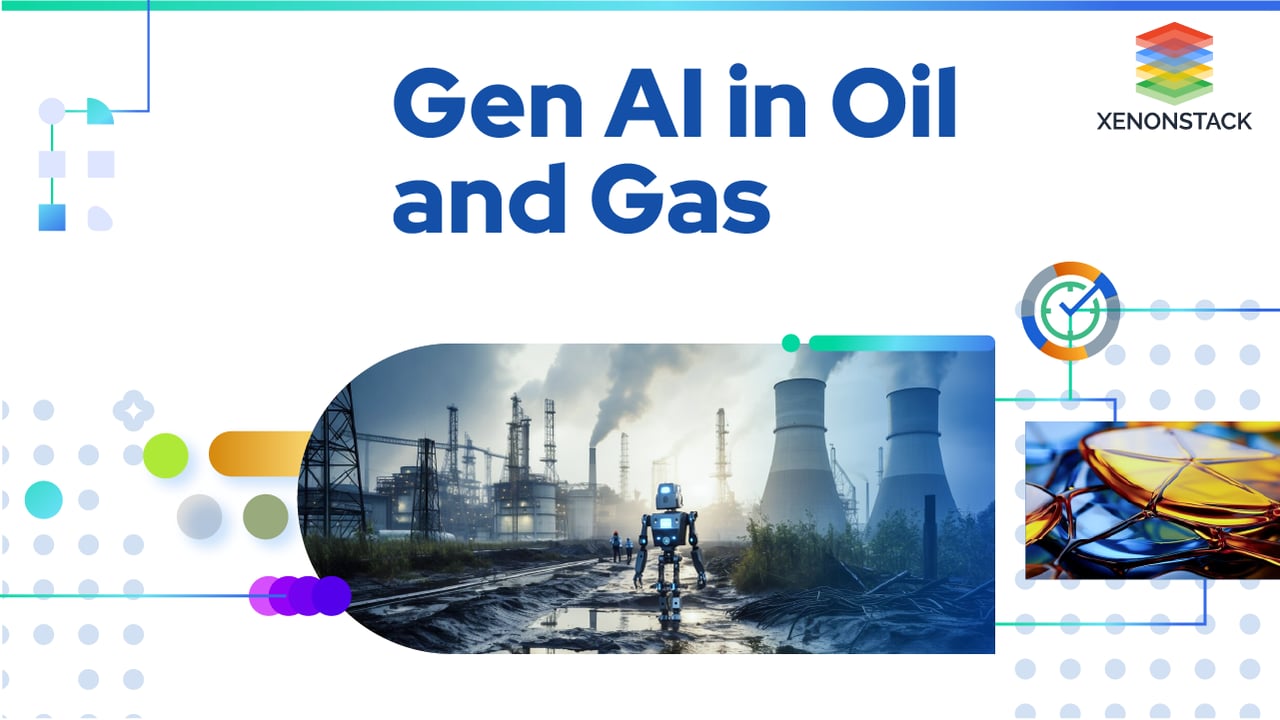
The ever-growing influence of generative AI in the Oil and Gas industry
The oil and gas AI market is predicted to reach USD 4.63 billion by 2028, growing at a CAGR of 11.68% between 2023 and 2028. Effective management of facilities is crucial for oil and gas companies that operate globally. The increasing adoption of artificial intelligence (AI) in the industry is optimizing operations and reducing costs. Generative AI is a revolutionary technology that utilizes machine learning algorithms to create new data. This innovation has transformed various industries, enabling the development of new solutions and the optimization of existing processes. Its Large Language Models (LLMs) are powerful for predicting outcomes and recognizing trends. As a result, many oil and gas companies are embracing disruptive technologies like generative AI to achieve autonomous operations and stay competitive.
Harnessing the Power of Generative AI in the Oil and Gas Sector
Generative AI has the potential to revolutionize the oil and gas industry by optimizing refinery processes, from crude oil distillation to product blending and yield optimization, predictive maintenance of equipment and machinery, risk management, and real-time monitoring of operations.
Applications demonstrate the potential of generative AI to revolutionize various aspects of the oil and gas industry, from exploration to production and environmental sustainability.
However, it's essential to be mindful of potential risks associated with generative AI, especially in a safety-critical industry like oil and gas
Applications of Generative AI in the Oil and gas Industry
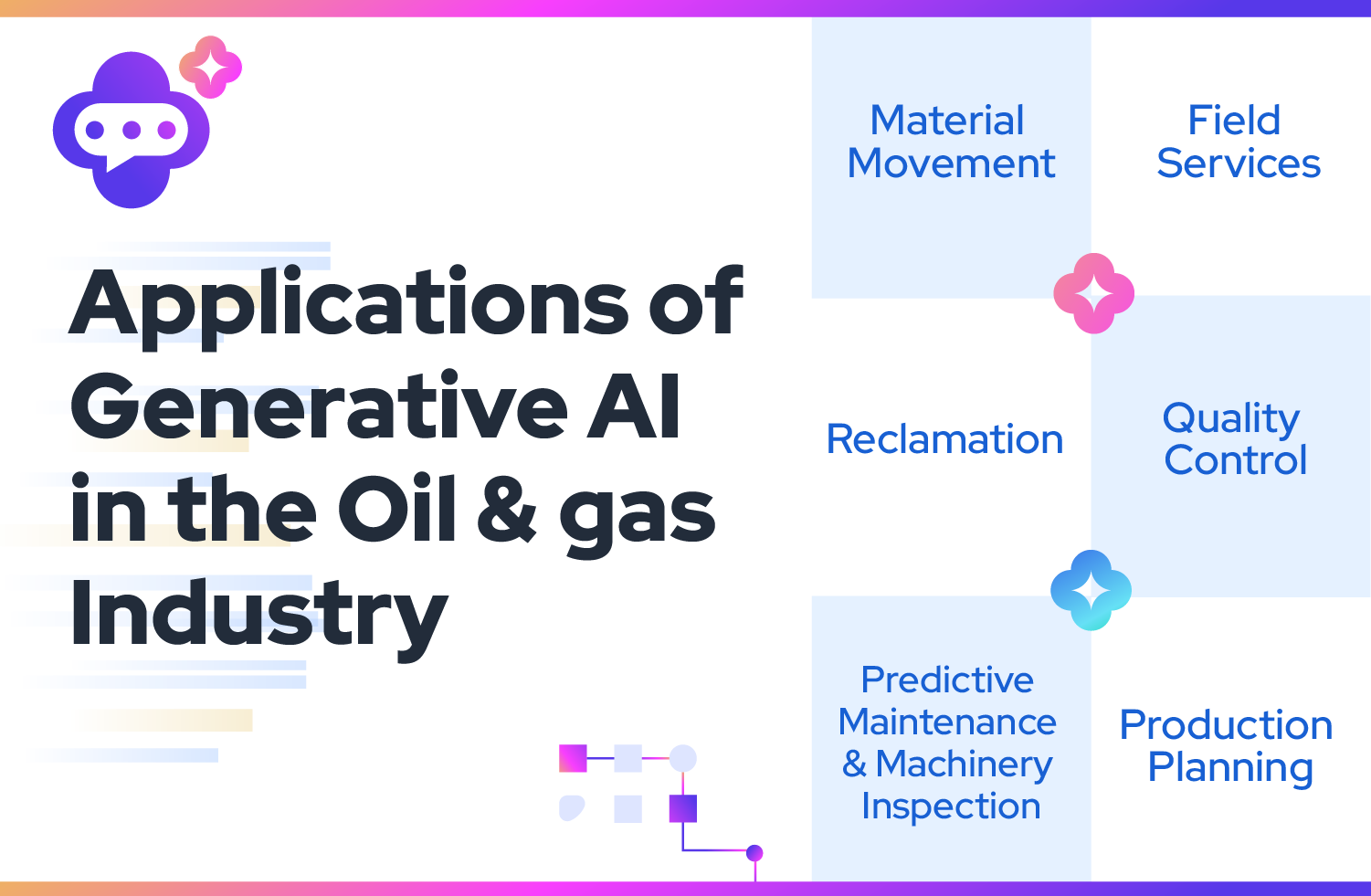
The Oil and Gas industry can benefit from using Generative AI in various ways.
1. Predictive Maintenance and Machinery Inspection
Predictive maintenance uses IoT technology to inspect equipment in real-time, anticipate maintenance needs, prevent unplanned failures, and reduce oil and gas industry costs. It employs vibration monitoring, thermography, lubricant oil analysis, and ultrasonic testing.
Issue/Opportunity
Reliability and safety of equipment and facilities are crucial in the oil and gas industry. Traditional predictive maintenance and machinery inspection methods are costly, time-consuming and prone to errors. AI, machine learning, sensors, and drones can improve these practices' efficiency, accuracy, and effectiveness.
How can Gen AI help?
-
Anomaly Detection and Fault Analysis: Gen AI thoroughly analyzes data streams from diverse sources, such as sensors, cameras, and drones. By doing so, it efficiently detects anomalies and faults in machinery and equipment.
-
Recommendations for Preventive Actions: Gen AI generates precise recommendations for preventive actions and necessary repairs based on the severity and urgency of identified issues. This proactive approach helps minimize downtime and prevent potential failures.
-
Worker and Equipment Safety: Gen AI significantly enhances the safety of both workers and equipment by providing timely insights into potential hazards. Identifying and addressing issues before they escalate contributes to a safer working environment.
- Operational Efficiency: Through its predictive maintenance capabilities, Gen AI aids in optimizing the overall efficiency of industrial operations. Addressing potential problems in advance supports smoother workflows and reduces the risk of unexpected disruptions.
2. Material Movement
Material Movement in the oil and gas industry refers to transporting and storing the raw materials from the extraction sites to the refineries and then to the final customers. It is an essential part of materials management that ensures the availability and quality of materials for production and consumption. Material Movement involves various modes of transportation, such as pipelines, trucks, ships, and storage facilities, such as tanks, warehouses, and terminals.
Issue/Opportunity
Material movement is a crucial process in the oil and gas industry, as it involves transporting raw materials, intermediate products and final products from one location to another. However, material movement poses challenges and risks, such as environmental impacts, safety hazards, operational inefficiencies and cost overruns. Therefore, there is an issue/opportunity to improve the material movement process in the oil and gas industry by adopting innovative technologies, best practices and standards.
How can Gen AI help?
-
Optimization of Transportation Routes and Schedules: Gen AI optimizes transportation logistics for oil and gas companies. It analyzes data to optimize routes and schedules for trucks, pipelines, and ships, ensuring efficient and timely delivery while minimizing costs.
-
Monitoring and Predictive Maintenance for Material Handling Equipment: Gen AI goes beyond predictive maintenance for machinery in general and extends its expertise to material handling equipment. Gen AI uses advanced monitoring to predict maintenance needs in equipment. This proactive approach helps prevent breakdowns and ensures the reliability of material handling operations.
-
Enhanced Safety and Efficiency in Material Movement: Gen AI is essential for the safe and efficient movement of materials in industrial facilities. It detects anomalies, hazards, and risks associated with material handling by continuously analyzing data. This capability allows for the swift identification and mitigation of potential issues, contributing to a safer and more efficient working environment.
3. Production Planning
Production Planning in the oil and gas industry identifies, coordinates, and optimizes the resources and activities needed to achieve specific exploration, production, and distribution goals. It involves managing complex and risky tasks such as drilling wells, establishing production facilities, and delivering petroleum products to consumers.
Issue/Opportunity
Production planning in the oil and gas industry is a significant challenge. Manual or essential tools like spreadsheets are often used, leading to suboptimal decisions, inefficiencies, and wasted resources. This is due to the complexity and uncertainty of oil and gas operations.
How can Gen AI help?
-
Optimized Production Planning: At the core of its capabilities, Gen AI specializes in using artificial intelligence to optimize production planning within the oil and gas industry. Leveraging advanced algorithms ensures that production processes are streamlined for maximum efficiency.
-
Cost Reduction, Efficiency Increase, and Safety Improvement: Gen AI is essential in pursuing cost reduction, efficiency enhancement, and safety improvement. The platform provides valuable insights and recommendations through meticulous data analysis. This enables stakeholders to make informed decisions that cut costs, boost efficiency, and prioritize safety measures.
-
Demand Forecasting and Inventory Management: Gen AI extends its impact beyond production planning to include demand forecasting and inventory management. By analyzing relevant data, it assists in accurately predicting demand patterns. This foresight enables better control of inventory levels, reducing the likelihood of overstocking or shortages.
- Optimized Logistics and Distribution: The platform's capabilities extend to optimizing logistics and distribution processes. Gen AI utilizes artificial intelligence to analyze transportation, distribution networks, and supply chain dynamics data. Efficient allocation of resources helps to reduce transit times and costs."
4. Field Services
Field services in the oil and gas industry support the exploration and production of oil and gas, mainly in the upstream sector. They include energy source location, drilling, sound construction, equipment manufacturing, maintenance, repair, and data.
Issue/Opportunity
The oil and gas industry needs to optimize field services. These services involve installing, maintaining, repairing, or replacing equipment and infrastructure in remote and harsh locations. Traditional methods are expensive, risky, and time-consuming. Technology such as drones, robots, sensors, AI, and cloud computing can improve efficiency, quality, and safety.
How can Gen AI help?
-
Optimized Scheduling and Routing for Field Service Technicians: Gen AI excels in optimizing the scheduling and routing of field service technicians. By utilizing artificial intelligence, the platform ensures that field service operations are efficiently planned, minimizing travel time and maximizing resource utilization.
-
Enhanced Safety and Compliance through Anomaly Detection: Safety and compliance are paramount in field service operations, and Gen AI plays a crucial role in enhancing both. The platform employs advanced analytics to detect anomalies and risks, contributing to a safer working environment and ensuring compliance with industry regulations.
-
Improved Customer Satisfaction and Retention: Gen AI significantly contributes to customer satisfaction and retention by providing proactive and personalized service. Through the analysis of historical data and real-time information, the platform anticipates customer needs, resolves issues promptly, and tailors services to individual preferences, fostering positive customer experiences.
-
Cost Reduction and Increased Efficiency through Automation: Gen AI's automation capabilities extend to various tasks and workflows, leading to significant cost reductions and increased operational efficiency. By automating repetitive processes, the platform allows field service teams to focus on more complex and strategic aspects of their roles.
5. Quality Control
Quality Control (QC) in the oil and gas industry is the process of testing and inspecting the materials, equipment and components used in the production and operation of oil and gas projects. QC ensures that the quality standards, regulations and specifications are met and that the products are safe, reliable and fit for purpose. Quality Control is part of Quality Assurance (QA), the overall quality system in the oil and gas industry.
Issue/Opportunity
Quality control is crucial in the oil and gas industry to avoid accidents, environmental damage, and financial losses. However, traditional quality control methods are costly, time-consuming, and prone to human errors. The industry can use innovative technologies and techniques to improve quality control.
How can Gen AI help?
-
Optimized Quality Control Processes: Gen AI is a robust platform that leverages artificial intelligence to optimize quality control processes in the oil and gas industry. Its advanced capabilities contribute to maintaining and enhancing the overall quality of operations.
-
Cost Reduction, Safety Improvement, and Efficiency Enhancement: By automating inspections, detecting anomalies, and predicting potential failures, Gen AI becomes a catalyst for reducing costs, improving safety, and enhancing efficiency in quality control. The platform ensures that inspections are thorough, anomalies are promptly identified, and potential failures are predicted, preventing costly issues and ensuring a safer and more efficient work environment.
-
Improved Decision-Making, Collaboration, and Innovation: Gen AI actively contributes to decision-making processes beyond automation and detection. The platform provides valuable insights, recommendations, and feedback, empowering decision-makers to make informed choices. Additionally, Gen AI fosters collaboration among teams and promotes innovation by continuously offering data-driven insights into improving processes
6. Reclamation
Reclamation in the oil and gas industry returns disturbed land to its original condition or use after extracting oil and gas resources. Reclamation typically involves removing structures and materials, restoring vegetation and waterways, and preventing erosion. Reclamation is integral to environmental management and regulatory compliance for oil and gas operators.
Issue/Opportunity
Reclamation in oil and gas activities is restoring the land to its original condition. This involves removing equipment, plugging wells, contouring the land, and revegetating the site. However, more than the traditional approach may be needed to address environmental and social impacts. The industry can improve its reclamation practices by adopting innovative and sustainable methods that enhance the ecological and socio-economic benefits of the reclaimed land.
How can Gen AI help?
- Optimizing Reclamation Processes: Gen AI is a transformative platform enabling oil and gas companies to optimize their reclamation processes through artificial intelligence.
-
Environmental Monitoring with Satellite Imagery and Drone Data: Gen AI utilizes cutting-edge technology by analyzing satellite imagery and drone data to monitor the environmental impact of oil and gas operations. This enables real-time assessment and proactive measures to address any ecological changes.
-
Insights and Recommendations for Land Restoration: The platform provides valuable insights and recommendations for restoring the land and vegetation after extraction."This involves data-driven guidance for effective reclamation strategies, contributing to sustainable environmental practices.
-
Automated Documentation and Reporting for Compliance: Gen AI brings automation to the forefront by streamlining the documentation and reporting of reclamation activities. This ensures compliance with regulatory requirements and provides a comprehensive and easily accessible record of the reclamation process.
-
Enhanced Safety and Efficiency for Reclamation Workers and Equipment: Safety and efficiency are paramount in reclamation activities. Gen AI enhances both by providing insights and recommendations that contribute to the safety of workers and equipment. This includes real-time risk assessment and optimization of workflows.
Challenges in Gen AI adoption in oil and gas industry
Generative AI adoption in the Oil and gas industry faces several challenges that need careful consideration for successful implementation:
-
High Upfront Costs and Investment Risks: Adopting new AI technologies often involves significant upfront costs, including hardware, software, and training investments. Companies may be hesitant due to concerns about whether the investment will yield expected returns, considering potential risks and uncertainties.
-
Lack of Trust and Transparency in Data: AI systems rely heavily on data quality, security, and governance. The industry may face challenges in ensuring the accuracy, privacy, and security of the data used in AI applications. A lack of transparency in how AI algorithms make decisions can also contribute to trust issues.
-
Regulatory and Ethical Concerns: The oil and gas industry is subject to stringent regulations, and adopting AI raises ethical considerations. Companies must navigate regulations governing environmental impacts, data privacy, and human rights. Ensuring compliance with these regulations while deploying AI solutions can be complex.
-
Resistance to Change and Cultural Barriers: The introduction of AI may face resistance from the workforce and stakeholders who perceive it as a threat to job security or fear disruption to established roles and processes. Overcoming this resistance requires effective communication, change management strategies, and fostering a culture of innovation and collaboration.
-
Limited Skilled Talent and Expertise: The demand for skilled professionals in AI and related domains often exceeds the available talent pool. Acquiring and retaining AI, machine learning, and data science experts can be challenging. This shortage can hinder the successful implementation of AI initiatives.
-
Integration and Interoperability Challenges: The oil and gas industry typically rely on legacy systems and platforms. Integrating new AI solutions with existing infrastructure can pose technical challenges. Achieving interoperability and ensuring smooth collaboration between legacy systems and AI technologies is essential for a seamless transition.
Conclusion
Oil and gas companies can leverage generative AI to optimize operations and reduce their carbon footprint. However, deploying generative AI models requires a robust and secure IT infrastructure, which can be challenging in harsh environments. To overcome this challenge, oil and gas companies can partner with Xenonstack, an infrastructure and energy management solutions leader. Xenonstack offers edge computing services that can withstand extreme conditions and protect generative AI capabilities.
-
Read here about Seasonality Analysis for Power Generation
-
Know more about Generative AI for the Retail Industry




